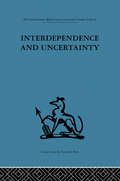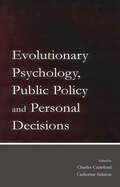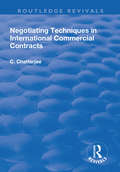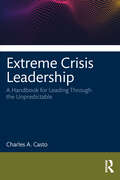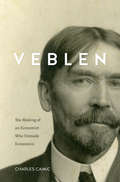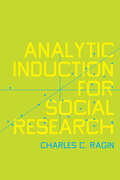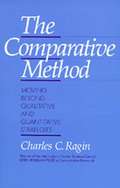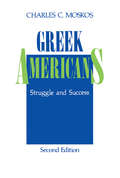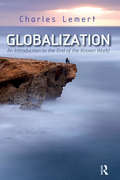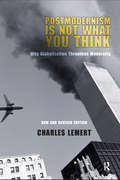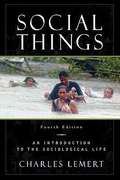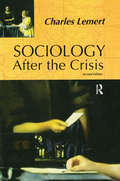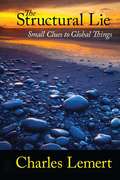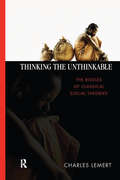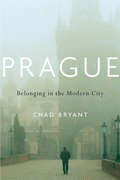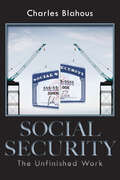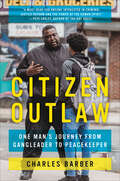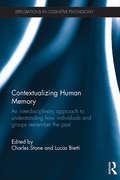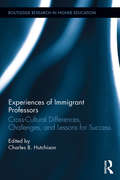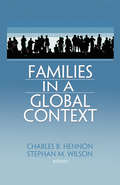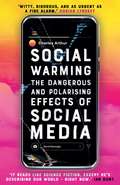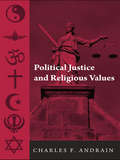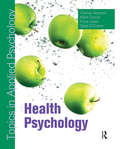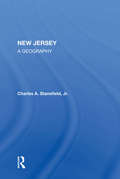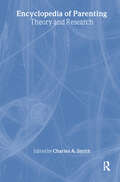- Table View
- List View
Interdependence and Uncertainty: A study of the building industry
by Charles CrichtonTavistock Press was established as a co-operative venture between the Tavistock Institute and Routledge & Kegan Paul (RKP) in the 1950s to produce a series of major contributions across the social sciences. This volume is part of a 2001 reissue of a selection of those important works which have since gone out of print, or are difficult to locate. Published by Routledge, 112 volumes in total are being brought together under the name The International Behavioural and Social Sciences Library: Classics from the Tavistock Press. Reproduced here in facsimile, this volume was originally published in 1966 and is available individually. The collection is also available in a number of themed mini-sets of between 5 and 13 volumes, or as a complete collection.
Evolutionary Psychology, Public Policy and Personal Decisions
by Charles Crawford Catherine SalmonDuring the last 15 years, human sociobiology has metamorphosed into evolutionary psychology. It is concerned with the social problems and stresses hominid and primate ancestors encountered, the psychological mechanisms natural selection shaped to deal with these stresses, and the way those ancient mechanisms work now. Evolutionary psychologists are making great progress in expanding the understanding of human nature, however, this knowledge has had little impact on policymakers and legislators. Supreme Court justices and managers seldom consult evolutionary psychologists to help with their deliberations. When faced with private decisions few individuals ask themselves how a Darwinian perspective might help them. This volume's aim is to start the process of using theory and findings of evolutionary psychology to help make the world a better place to live. This book takes evolutionary psychology explicitly into applied areas in a way no other book has. It includes a reasonable scope of applications from pornography to psychopaths and from morality to sex differences in the workplace. An applications section provides concrete ideas for dealing with social and policy issues, including chapters on women in the workplace, rape, and child support. Providing good coverage of basic issues and theory of the field, this book gives lay people and law/policymakers appropriate background to fully understand the applications chapters. Part II provides information on basic psychological mechanisms for group living--including chapters on emotions, reciprocity and legal reasoning, and self deception--that impact on how well public policy and law function. The material in the first two sections provide an intellectual basis for the chapters in the third part of the book which deals with the application of evolutionary psychology to a variety of substantive areas related to public policy and personal decisions. A political scientist concludes the book with a commentary on evolutionary psychology and public policy. The book is designed to serve as a stand-alone text in evolutionary psychology and public policy that can be used in a variety of disciplines, such as psychology, social work, law and psychology, and public policy.
Negotiating Techniques in International Commercial Contracts
by Charles ChatterjeeDrafting and Negotiating Commercial Contracts, Fourth Edition is the 'one-stop-shop' for practical contractual matters, making it essential reading for anyone involved in negotiating and drafting commercial contracts.Many works published on the topic of negotiating have dealt with techniques of and preparation for negotiation from a psychological standpoint, but this book contends that in the commercial world, hard commercial considerations rather than psychological warfare matter most in successfully negotiating commercial contracts. The text highlights the most important special features of selected contracts, namely payment contracts and petroleum contracts in addition to ordinary export contracts, syndicated loan agreements, international engineering and construction contracts, and issues relating to project finance and risk. One of the basic themes of this work is to remind negotiators of the changing attitudes towards the negotiation of international commercial contracts, including more awareness of bargaining powers of both parties. The Fourth Edition has been fully updated to take account of important court decisions regarding the interpretation of contracts and changes in consumer legislation. This includes commercial lawyers, contract managers, in-house lawyers, lawyers in private practice, LPC course tutors and law and business students.
Extreme Crisis Leadership: A Handbook for Leading Through the Unpredictable
by Charles CastoThis concise handbook presents a framework to help leaders across sectors understand what their role should be in an extreme crisis and supplements this understanding with practical advice. Leadership is often presented as a kind of mastery—but no single person can master an extreme crisis event such as the COVID-19 pandemic. Leaders need a workable resource based on research and experience that can be accessed quickly and referenced easily to effectively handle crises and mitigate repercussions: This handbook is that resource. It begins with diagnostic tools to identify crisis types and leadership roles, then presents an easy-to-use matrix framework that allows readers to focus on the specific example-based section that best fits their role and the kind of crisis they face. This handbook is accessible to leaders at all levels, from shift supervisors and emergency responders to CEOs and government executives. It will be an essential ready reference for any leader who might expect to encounter an extreme crisis, as well as for those who would not have foreseen themselves in such a situation.
Veblen (Routledge Studies In The History Of Economics Ser. #115)
by Charles CamicA bold new biography of the thinker who demolished accepted economic theories in order to expose how people of economic and social privilege plunder their wealth from society’s productive men and women.Thorstein Veblen was one of America’s most penetrating analysts of modern capitalist society. But he was not, as is widely assumed, an outsider to the social world he acidly described. Veblen overturns the long-accepted view that Veblen’s ideas, including his insights about conspicuous consumption and the leisure class, derived from his position as a social outsider.In the hinterlands of America’s Midwest, Veblen’s schooling coincided with the late nineteenth-century revolution in higher education that occurred under the patronage of the titans of the new industrial age. The resulting educational opportunities carried Veblen from local Carleton College to centers of scholarship at Johns Hopkins, Yale, Cornell, and the University of Chicago, where he studied with leading philosophers, historians, and economists. Afterward, he joined the nation’s academic elite as a professional economist, producing his seminal books The Theory of the Leisure Class and The Theory of Business Enterprise. Until late in his career, Veblen was, Charles Camic argues, the consummate academic insider, engaged in debates about wealth distribution raging in the field of economics.Veblen demonstrates how Veblen’s education and subsequent involvement in those debates gave rise to his original ideas about the social institutions that enable wealthy Americans—a swarm of economically unproductive “parasites”—to amass vast fortunes on the backs of productive men and women. Today, when great wealth inequalities again command national attention, Camic helps us understand the historical roots and continuing reach of Veblen’s searing analysis of this “sclerosis of the American soul.”
Analytic Induction for Social Research
by Charles C. RaginA free ebook version of this title is available through Luminos, University of California Press’s Open Access publishing program. Visit www.luminosoa.org to learn more. This book explores analytic induction, an approach to the analysis of cross-case evidence on qualitative outcomes that has deep roots in sociology. A popular research technique in the early decades of empirical sociology, analytic induction differs fundamentally as a method of social research from conventional variation-based approaches. In Analytic Induction for Social Research, Charles C. Ragin demonstrates that much is gained from systematizing analytic induction. The approach he introduces here offers a new template for conducting cross-case analysis and provides a new set of tools for answering common research questions that existing methods cannot address.
The Comparative Method: Moving Beyond Qualitative and Quantitative Strategies
by Charles C. RaginProfessor Ragin proposes a synthetic new strategy, based on an application of Boolean algebra, that will combine the strengths of both qualitative and quantitative sociology. Elegantly accessible and germane to the work of all the social sciences, this book will garner interest, debate, and praise from many quarters.
Greek Americans: Struggle and Success
by Charles C. MoskosThis is an engrossing account of Greek Americans--their history, strengths, conflicts, aspirations, and contributions. This is the story of immigrants, their children and grandchildren, most of whom maintain an attachment to Greek ethnic identity even as they have become one of this country's most successful ethnic groups.
Globalization: An Introduction to the End of the Known World
by Charles C. Lemert"Globalization: An Introduction to the End of the Known World" surveys the history of globalization from the earliest of ancient texts through contemporary debates and the prospects for anticipating the new worlds to come. At the end of the twentieth century, debates over the nature of globalization were unable to agree on a simple resolution, except to say that globalization is economic, political, and cultural all at once. Cultural globalization affects everyone with a smartphone, on which global youth from Los Angeles to Jakarta listen to Jay-Z and Beyonce. States are torn in several directions at once by unsettling economic, political, and cultural forces. Lemert concludes with a serious outline of the possible ways of imagining what the still-unknown global world will become next ways including optimism, caution, and skepticism."
Postmodernism is Not What You Think
by Charles C. Lemert'Charles Lemert is one of the most thoughtful and interesting of sociology's postmodernists. He recurrently finds new angles of vision and is especially helpful for overcoming the pernicious opposition of 'micro' and 'macro' perspectives.' -Craig Calhoun, New York University (on the first edition) Highly readable, the second edition of Postmodernism Is Not What You Think responds to the widespread claim that postmodernism is over. It explains the historical connections between the postmodern and globalization. Those who wish to kill the term postmodernism still must face the facts that the former nationalistic world-system has collapsed and is slowly being replaced by a more global set of structures. The book is completely revised and updated with an entirely new section on globalization. The media and popular culture, identity politics, the science wars, politics and cultural studies, structuralism and poststructuralism, and the new sociologies are also put in perspective as signs of the new social formations dawning at the end of the modern age. Lemert shows that the postmodern is less a theory than a condition of social life brought about by the trouble modernity has gotten itself into.
Social Things: An Introduction to the Sociological Life (4th edition)
by Charles C. LemertLemert (sociology, Wesleyan U.) describes his frustrations and accommodations to a life in sociology, along with the moments in which he and his discipline are one while examining the history of trends within sociology from the middle of the nineteenth to the last quarter of the twentieth, ending with the years in which he claims sociology discovered its "complicated vocation." Along with his pithy observations on why sociologists tended to think what and when, he is particularly acute in describing why globalization came at a time when it could only make poverty and deprivation, which were already on the rise, worse for more people, and what sociologists can do about the situation and still be human beings.
Sociology After the Crisis
by Charles C. LemertWidely assigned and taught in senior capstone and social theory courses, Sociology After the Crisis offers the first systematic theory of social differences built on the sociological traditions by embracing to Durkheim, Weber and other familiar figures. The first edition was acclaimed for its nuanced and original rereading of Durkheim in relation to the theoretical reasons he and his contemporaries neglected race and gender. This new edition features two chapters of new material written in the summer of 2003, as the new social structures of the 21st century became increasingly clear. The new Chapter Ten draws upon 9-11, the "new world order" of two Bush presidencies, and globalization to show how individuals' lives and sociologies must be thought about in new ways. These events also highlight how American society and sociology have responded and sometimes failed in the struggle over the crisis of modernism. Reviews for the First Edition: "[This] expansive reimagining of the historical roots of sociological imagination - especially as it embraces voices and visions long lost to our most important national debates - is balm to the fractured soul of American society. Lemert's elegant and passionate volume will aid immeasurably in our nation's search for sane solutions to the crises of purpose and perspective he so skillfully explores." Michael Eric Dyson, author of Making Malcolm and Between God and Gangsta' Rap "Elegantly crafted." Steven Seidman, State University of New York at Albany
Structural Lie: Small Clues to Global Things
by Charles C. LemertThe Structural Lie tackles one of social science's most mysterious problems. How is it possible to derive statements about the grand structures of social life from their effects in the small movements of everyday life? Prominent sociologist Charles Lemert shows how Marx and Freud provide some answers to this question. Marx derived from the commodity his picture of the capitalist system, Freud diagnosed the character of psyches from the details of dreams, slips and jokes. This wonderfully readable and engaging book lays the foundation for a new social science in an age where a microchip can convey a world of information.
Thinking the Unthinkable: The Riddles of Classical Social Theories
by Charles C. LemertIn the eloquent style for which he has become famous, Charles Lemert writes of social theory as no one else. Thinking the Unthinkable is offered as text for instruction, yet it defies the prevailing assumption that social theory is a method for clarifying the facts of social life. Lemert shows how social theory began late in the 19th century as a struggle to come to terms with the failure of modern reason to solve the social problems created by the capitalist world-system. Since then, social theory has developed through twists and turns to think and rethink this Unthinkable. Hence the surprising innovations of recent years-postmodern, queer, postcolonial, third-wave feminist, risk theories, among others arising in the wake of globalization. Once again, Lemert has made the difficult clear in a book that students and other readers will treasure and keep.
Prague: Belonging in the Modern City
by Charles BryantA poignant reflection on alienation and belonging, told through the lives of five remarkable people who struggled against nationalism and intolerance in one of Europe’s most stunning cities. What does it mean to belong somewhere? For many of Prague’s inhabitants, belonging has been linked to the nation, embodied in the capital city. Grandiose medieval buildings and monuments to national heroes boast of a glorious, shared history. Past governments, democratic and Communist, layered the city with architecture that melded politics and nationhood. Not all inhabitants, however, felt included in these efforts to nurture national belonging. Socialists, dissidents, Jews, Germans, and Vietnamese—all have been subject to hatred and political persecution in the city they called home. Chad Bryant tells the stories of five marginalized individuals who, over the last two centuries, forged their own notions of belonging in one of Europe’s great cities. An aspiring guidebook writer, a German-speaking newspaperman, a Bolshevik carpenter, an actress of mixed heritage who came of age during the Communist terror, and a Czech-speaking Vietnamese blogger: none of them is famous, but their lives are revealing. They speak to tensions between exclusionary nationalism and on-the-ground diversity. In their struggles against alienation and dislocation, they forged alternative communities in cafes, workplaces, and online. While strolling park paths, joining political marches, or writing about their lives, these outsiders came to embody a city that, on its surface, was built for others. A powerful and creative meditation on place and nation, the individual and community, Prague envisions how cohesion and difference might coexist as it acknowledges a need common to all.
Social Security: The Unfinished Work
by Charles BlahousArguing that an equitable Social Security solution will be unattainable unless we bring stakeholders together around a common understanding of the facts and of the need to take action to address them, former White House adviser Charles Blahous presents some often misunderstood, basic factual background about Social Security. He discusses how it affects program participants and explains the true demographic, economic, and political factors that threaten its future efficacy.
Citizen Outlaw: One Man's Journey from Gangleader to Peacekeeper
by Charles BarberA VITAL NEXT CHAPTER IN THE ONGOING CONVERSATION ABOUT RACE AND SOCIAL JUSTICE IN AMERICAWhen he was in his early twenties, William Juneboy Outlaw iii was sentenced to eighty-five years in prison for homicide and armed assault. The sentence brought his brief but prolific criminal career as the head of a forty-member cocaine gang in New Haven, Connecticut, to a close. But behind bars, Outlaw quickly became a feared prison “shot caller” with 100 men under his sway.Then everything changed: His original sentence was reduced by sixty years. At the same time, he was shipped to a series of America’s most notorious federal prisons, where he endured long stints in solitary confinement—and where transformational relationships with a fellow inmate and with a prison therapist made him realize that he wanted more for himself.Upon his release, Outlaw took a job at Dunkin’ Donuts, began volunteering in New Haven, and started to rebuild his life. Now an award-winning community advocate, he leads a team of former felons in negotiating truces between gangs on the very streets that he once terrorized. The homicide rate in New Haven has decreased by 70 percent in the decade that he’s run the team—a drop as dramatic as in any city in the country.Written with exclusive access to Outlaw himself, Charles Barber’s Citizen Outlaw is the unforgettable story of how a gangleader became the catalyst for one of the greatest civic crime reductions in America, and an inspiring argument for love and compassion in the face of insurmountable odds.
Contextualizing Human Memory: An interdisciplinary approach to understanding how individuals and groups remember the past (Explorations in Cognitive Psychology)
by Charles B. Stone and Lucas M. BiettiThis edited collection provides an inter- and intra-disciplinary discussion of the critical role context plays in how and when individuals and groups remember the past. International contributors integrate key research from a range of disciplines, including social and cognitive psychology, discursive psychology, philosophy/philosophical psychology and cognitive linguistics, to increase awareness of the central role that cultural, social and technological contexts play in determining individual and collective recollections at multiple, yet interconnected, levels of human experience. Divided into three parts, cognitive and psychological perspectives, social and cultural perspectives, and cognitive linguistics and philosophical perspectives, Stone and Bietti present a breadth of research on memory in context. Topics covered include: the construction of self-identity in memory flashbulb memories scaffolding memory the cultural psychology of remembering social aspects of memory the mnemonic consequences of silence emotion and memory eyewitness identification multimodal communication and collective remembering. Contextualizing Human Memory allows researchers to understand the variety of work undertaken in related fields, and to appreciate the importance of context in understanding when, how and what is remembered at any given recollection. The book will appeal to researchers, academics and postgraduate students in the fields of cognitive and social psychology, as well as those in related disciplines interested in learning more about the advancing field of memory studies.
Experiences of Immigrant Professors: Challenges, Cross-Cultural Differences, and Lessons for Success (Routledge Research in Higher Education)
by Charles B. HutchisonEducational institutions all over the world continue to attract the services of foreign-born scholars. In addition to the culture shock that immigrants experience in unfamiliar countries, these scholars often undergo "pedagogical shock." Through autobiographical accounts of foreign-born professors from Africa, Asia, Europe, and the US, this volume examines the experiences of foreign-born professors around the world to provide insight on the curricular, school-systemic, and sociological differences and challenges that are encountered, and how to help resolve them. It will help administrators, institutions, and immigration and comparative education scholars understand the cross-cultural challenges and coping strategies that define the private and professional lives of foreign-born professors across the globe.
Families in a Global Context
by Charles B. Hennon and Stephan M. WilsonLearn what trends and factors are influencing families globally How are families the same or different around the world? Families in a Global Context puts the similarities and differences into perspective, presenting an in-depth comparative analysis of family life in 17 countries around the world. Contributors discuss different countries' family life by using a standard framework to review major influences and patterns. The framework allows readers to do comparative reflection across several countries on a variety of daily living elements, including social and economic forces such as urbanization and modernization, changes in gender/courtship/spousal patterns, and war. This book provides an informative illustration of current as well as future trends of family life worldwide. Each chapter in Families in a Global Context describes customary types of family patterns within each country’s social organization and culture. Important social, economic, political, and other trends are explored in detail, and major ethnic, religious, or other subcultures are noted emphasizing marriage and family patterns that differ from the more typical ones. The book is extensively referenced and includes tables to clearly present data. Countries explored in Families in a Global Context include: European countries of Wales, Sweden, Germany, Romania, and Italy African countries of Sierra Leone, South Africa, and Kenya Middle Eastern countries of Turkey and Iran Asian and Oceanian countries of India, China, the Philippines, and Australia Latin American countries of Brazil, Mexico, and Cuba Topics discussed for each country in Families in a Global Context include: demographics mate selection patterns with an emphasis on the dynamics of couple formation marital roles the place and role of children and parenting in families socialization for gender roles differences in education, employment, and other opportunities major stressors affecting families, coping, and adaptation aging and life expectancy issues and much more! Families in a Global Context is an insightful resource for researchers, educators, and advanced undergraduate and graduate students investigating comparative family topics of family life around the world and in cultural context.
Social Warming: The Dangerous and Polarising Effects of Social Media
by Charles ArthurNobody meant for this to happen. Facebook didn&’t mean to facilitate a genocide. Twitter didn&’t want to be used to harass women. YouTube never planned to radicalise young men. But with billions of users, these platforms need only tweak their algorithms to generate more &‘engagement&’. In so doing, they bring unrest to previously settled communities and erode our relationships. Social warming has happened gradually – as a by-product of our preposterously convenient digital existence. But the gradual deterioration of our attitudes and behaviour on- and offline – this vicious cycle of anger and outrage – is real. And it can be corrected. Here&’s how.
Political Justice and Religious Values (Sociology Re-Wired)
by Charles AndrainWhy do individuals and groups hold distinctive theological views? Why do these beliefs change? In what ways do theological interpretations influence concepts of spiritual and political justice? How and why do these concepts of justice affect policy preferences held by religious liberals and conservatives? Much has recently been written about the relationship between power, conservative politics, and evangelical religious groups, but very little attention has been paid to so-called "progressive" religious groups among Protestants, Catholics, and Jews and their relationship to political thought and action. This wide-ranging and interdisciplinary work, ideal for use in college courses on religion and social issues, explores the impact of theological interpretations about God, the individual, society, church, and government on attitudes toward procedural and distributive justice. Major issues revolve around civil liberties, sexual choice, gender equality, world peace, prison reform, and income distribution
Health Psychology: Critical Concepts In Psychology (Topics in Applied Psychology)
by Charles AbrahamTopics in Applied Psychology offers a range of accessible, integrated texts ideal for courses in applied psychology. The books are written by leading figures in their field and provide a comprehensive academic and professional insight into each topic. They incorporate a range of features to bring psychology to life including case histories, research methods, ethical debate and learner activities. Each chapter opens with learning objectives to consolidate key points. A reading list and sample essay questions at the end of chapters enable further independent study. The series also offers an appreciation of multiple perspectives, examines the relationship between psychology and other cognate disciplines and discusses recent developments in each field. Topics in Applied Psychology will provide you with the tools you need to engage with, enjoy and understand your applied psychology discipline, ultimately ensuring confidence and success in exams as well as a comprehensive grounding in the profession. Health Psychology guides the reader through core issues in health psychology research and practice. Each chapter builds on previous ones so that the text provides an overview of the field rather than presenting a compendium of topics. The book discusses mechanisms, models and methods and examines how biological, cognitive, affective and social processes impact on health and illness. It also explores how stress and coping mechanisms affect health behaviours and the psychological determinants of health behaviour. Two chapters focus on how psychological research can be applied to change health-related attitudes and behaviours. Communication between the patient and practitioner is examined as is the role of the health psychologist. The integrated and interactive approach, combined with the comprehensive coverage, make this book the ideal companion for courses in health psychology.Other books in the series include: Clinical Psychology, Criminal Psychology, Educational Psychology, Organizational and Work Psychology and Sport and Exercise Psychology.
New Jersey: A Geography (Haunted Ser. #Vol. 8)
by Charles A. StansfieldNew Jersey. The name evokes many images, most of which are narrow stereotypes that fall short of reality. For example, though New Jersey's salient cultural characteristic is its high population density–the highest in the United States and higher than that of Britain–there is a surprising amount of open space in the state. Areas of the pinelands remain virtually unexplored, vast bogs are nearly impenetrable, and lush forests on the Appalachian ridges and holly-decked beaches on the ocean invite the city-weary urbanite. This geographic study of New Jersey, a multidimensional portrait of the state, incorporates three major themes: (1) the state's cultural diversity, an amalgam dating from colonial days, of many varied ethnic, national, and racial groups; (2) its bipolar orientation to two neighboring giant metropolitan areas, New York and Philadelphia, again a factor that dates to the time of the Revolution; and (3) an economy heavily influenced by the state's accessibility to major metropolitan centers and its well-developed corridor functions. Dr. Stansfield depicts New Jersey as a state others should watch: How it controls suburban sprawl, environmental deterioration, and the internal competition among agricultural, suburban, industrial, and recreational uses of land and water resources offers a model for the rest of the United States. Newark's Mayor Gibson observed of his city, "I don't know where America's cities are going, but I think Newark will get there first." It also might be fairly concluded, writes Dr. Stansfield, that wherever the United States is heading, New Jersey could get there first.
Encyclopedia of Parenting: Theory and Research
by Charles A. SmithParenting receives growing amounts of attention from researchers, and what was once considered chiefly an art is now also recognized for being a science. Our knowledge of parenting has increased significantly in the last few decades; new developments continue to happen daily. The Encyclopedia of Parenting provides, in reference book format, what we now know about parents, parenting, and the parent-child relationship, synthesized in some 250 alphabetically arranged entries. Each entry is written by an expert contributor and provides an authoritative overview of a particular topic. Subjects covered include: child activity; child outcomes; child states; parent behaviours; parental situations; external and community factors; systematic concerns; the transition to parenthood; available resources; persons who have added to our knowledge of the field. Entries draw on a wide range of disciplines, including psychology, education, and sociology. Each entry closes with a bibliography, and the volume concludes with a selected list of works for further reading.
